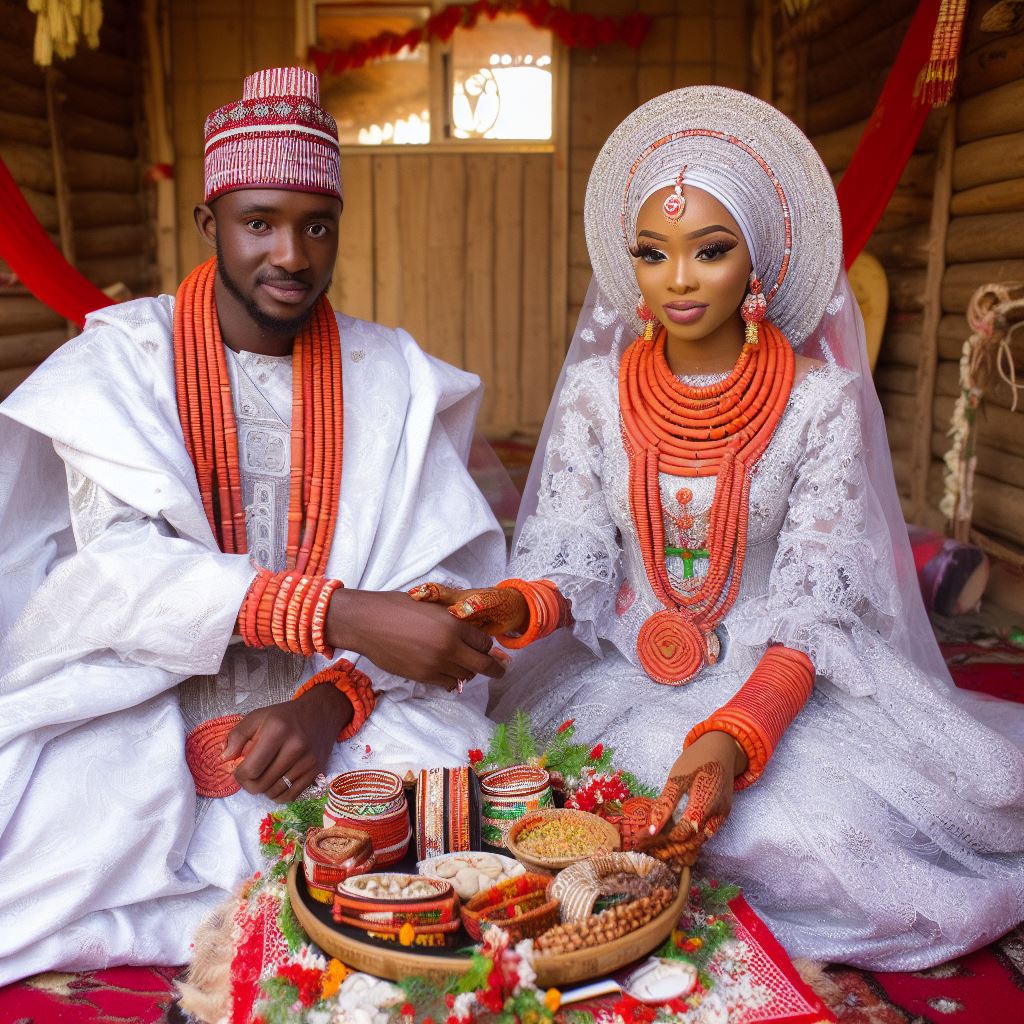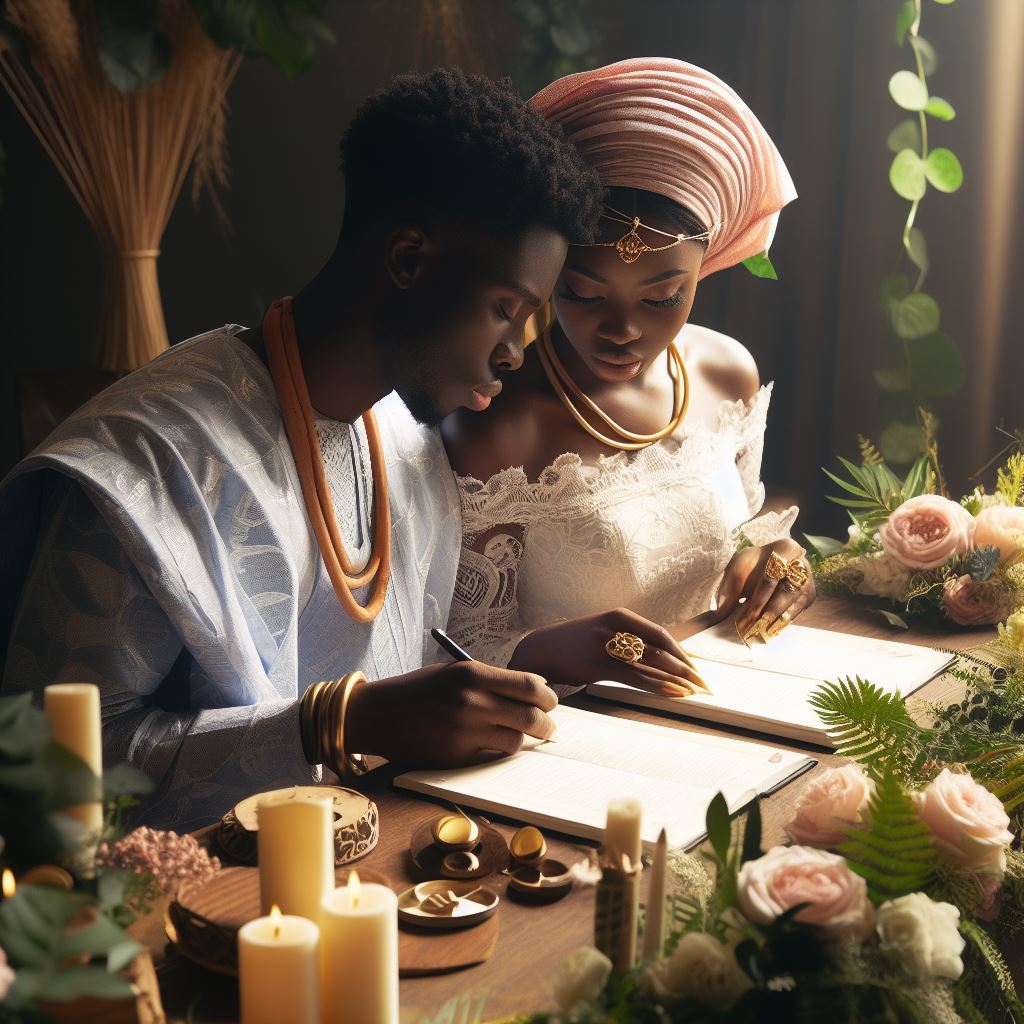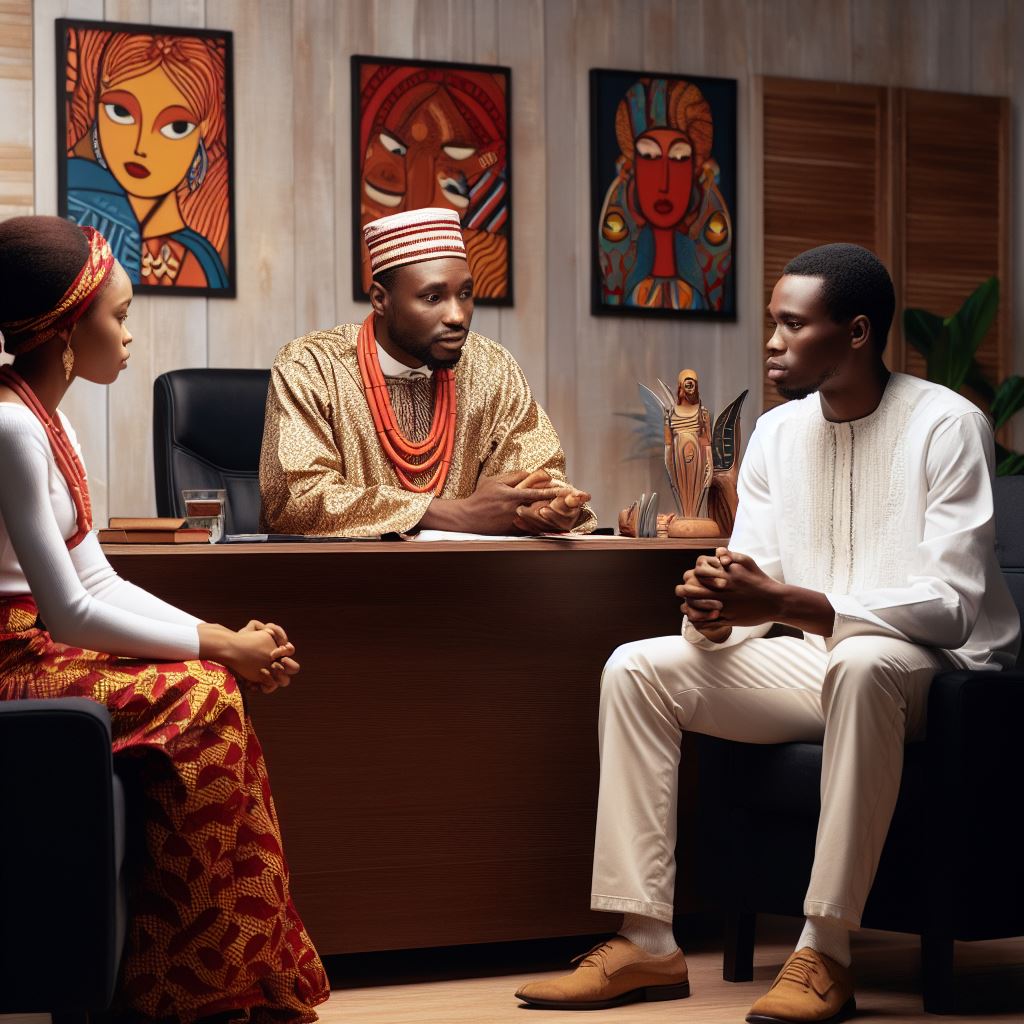Introduction
Exploring the rich tapestry of Hausa marriage rites in Nigeria unveils a vibrant cultural heritage.
Beyond the familiar vow exchange ceremony, Hausa marriages are steeped in profound traditions that intricately weave together families and communities.
Understanding these customs is paramount to appreciating the depth and significance of Hausa unions.
This section delves into the intricacies of Hausa marital traditions, guiding readers beyond the surface of vows into the heart of this cultural mosaic.
In this exploration, we will:
- Uncover the multifaceted rituals preceding the vow exchange.
- Embrace the communal celebrations uniting families and villages.
- Delve into the symbolic gestures and rituals laden with meaning.
- Discuss the vital role of elders and community in Hausa marriages.
- Examine the nuances of post-wedding customs, enriching the marital journey.
Embarking on this journey, we unravel the layers of Hausa matrimony, transcending mere ceremonies to embrace the soulful essence of this enduring cultural heritage.
Historical Background of Hausa Marriage Rites
The Hausa people, one of the largest ethnic groups in Nigeria, have a rich history of marriage customs that hold immense significance in their culture.
These customs have evolved over time, influenced by various factors such as cultural shifts and religious beliefs.
1. Historical Significance of Hausa Marriage Customs in Nigeria
- Hausa marriage customs play a crucial role in maintaining social harmony and stability within the community.
- These customs serve as a means of preserving cultural identity and heritage among the Hausa people.
- Marriage serves as a foundation for building strong family units, which in turn strengthens the community as a whole.
- Through these customs, the Hausa people establish alliances and forge connections between different families and lineages.
Evolution of Hausa Marriage Customs
- Hausa marriage customs have undergone significant changes over the years.
- Traditionally, marriages were arranged by parents or guardians, with little or no input from the individuals being married.
- However, with the influence of modernization and education, more Hausa individuals are now actively participating in the decision-making process.
- Interethnic marriages, once uncommon, have also become more accepted within the Hausa community, reflecting a shift towards inclusivity and diversity.
- The introduction of Islamic teachings has also impacted Hausa marriage customs, emphasizing the importance of consent and mutual respect in relationships.
Cultural and Religious Influences on Hausa Marriage Traditions
- The Hausa marriage customs are deeply rooted in their cultural and religious practices.
- The dominant religion in the Hausa community is Islam, which greatly influences their marriage traditions.
- Islamic teachings require the groom to provide a bride price or dowry to the bride’s family, symbolizing his commitment and ability to support his future wife.
- Hausa weddings often involve elaborate ceremonies that showcase traditional music, dances, and attire.
- The celebration of these customs strengthens the bond between the couple and their families.
In short, the historical background of Hausa marriage rites reveals their importance in the Nigerian society.
These customs have adapted to changing times while retaining their cultural and religious significance.
The evolution of Hausa marriage customs reflects a growing emphasis on individual choice and inclusivity, while still maintaining strong ties to tradition.
The continued practice of these customs ensures the preservation of Hausa culture and the celebration of their unique identity.
Read: Traditional Nigerian Wedding Vows: A Deep Dive
Pre-Marriage Rites
- Preliminary ceremonies before Hausa marriage are essential cultural practices, honoring traditions and strengthening community ties.
- Matchmaking, based on compatibility and family background, is a significant part of Hausa marriage rites.
- Dowry negotiations symbolize the groom’s commitment, emphasizing his responsibility for the bride’s care.
- Parental approval is mandatory, underscoring the cultural emphasis on family harmony and honoring parental authority.
- Traditional ceremonies like ‘Kayan Lalle’ involve joyful gatherings, adorning the bride with jewelry and blessings.
- ‘Kamu’ ceremony formally introduces the groom to the bride’s family, signifying acceptance into the community.
- ‘Gaisuwa’ or ‘Sharo’ festival tests young men’s bravery through a flogging competition, a unique marriage ritual.
- Successful completion of these rituals ensures harmonious marriages and preserves deep-rooted cultural values in Hausa society.
Read: Rekindling Romance: Therapy Tips for Long-Term Couples in Nigeria
The Wedding Ceremony
The wedding ceremony is a crucial event in a traditional Hausa wedding, consisting of various key elements.
- The Henna application is an essential ritual where the bride’s hands and feet are adorned with intricate designs.
- This ritual symbolizes beauty, fertility, and good luck for the bride as she embarks on her journey into marriage.
- The Kamu, also known as the bridal unveiling, is a moment where the bride finally reveals herself to the groom and the whole community.
- It is an exciting and highly anticipated event that signifies the transition of the bride from her family to her husband’s family.
- The bride wears a stunning outfit called a Zul which is often heavily embroidered and represents her new status as a married woman.
- The role of family in a Hausa wedding ceremony is paramount, as they play a significant part in every aspect of the event.
- The family members are responsible for organizing the ceremony, inviting guests, and ensuring that all the traditions are followed.
- Friends are also vital in the wedding ceremony as they provide support and help in making the event a memorable one.
- They assist in various activities such as dancing, singing, and preparing the bride for her big day.
- The community members play an integral role as well, as they are invited to celebrate and bless the union of the couple.
- They provide their blessings, advice, and well-wishes to the couple for a long and prosperous marriage.
Read: The Marriage Covenant: Drawing Wisdom from Scriptures

Post-Marriage Rites
In the previous blog section, we explored the fascinating Hausa marriage rites, focusing on the vow exchange during the wedding ceremony.
But the journey doesn’t end there.
After the wedding ceremony, there are a series of rituals and customs that take place to further solidify the bond between the couple and their families.
1. The Wuni (Bridal Farewell)
The Wuni is a significant ritual that takes place after the wedding ceremony.
It involves the departure of the bride from her parental home to her husband’s house.
This farewell symbolizes the transition from her maiden life to her new role as a wife.
The Wuni is a bittersweet moment for the bride and her family.
It signifies the bride leaving her childhood home, and her parents bid her farewell with mixed emotions of happiness and sadness.
This ritual often involves blessings, prayers, and advice from the elders.
2. The Sanda (Post-Wedding Celebration)
The Sanda is a joyous post-wedding celebration that follows the Wuni.
It is a grand event where the groom’s family welcomes the bride into their home with great enthusiasm and festivity.
This celebration is known for its vibrant colors, music, dancing, and delicious traditional Hausa food.
During the Sanda, the guests shower the couple with gifts, blessings, and well wishes.
It is also a time for the couple to bond with their new extended family members and forge new relationships.
This celebration showcases the unity and love between the couple, their families, and the community.
Significance of Post-Marriage Rites
The Wuni and Sanda hold immense importance in Hausa culture as they play a pivotal role in cementing the bond between the couple and their families.
Firstly, the Wuni signifies the bride’s transition into her new role and home.
It represents her acceptance into her husband’s family and their acceptance of her as their daughter-in-law.
This ritual fosters a sense of belonging and unity between the bride and her new family.
Secondly, the Sanda serves as a celebration of the couple’s union and the beginning of their new life together.
It brings together both families, demonstrating their support, love, and commitment to the couple’s happiness.
The joyous atmosphere during the Sanda helps create memories that will be cherished by the couple and their families for years to come.
Furthermore, these post-marriage rituals also help to strengthen the bond between the couple themselves.
The support and love they receive from their families during the Wuni and Sanda instill a sense of security and trust in their relationship.
It shows them that they have a strong foundation of love and support to rely on as they embark on their journey as husband and wife.
In fact, the post-marriage rites in Hausa culture, namely the Wuni and Sanda, are not merely ceremonies but rich traditions that hold great significance.
These rituals symbolize the transition of the bride into her new marital home and the celebration of the union between the couple and their families.
They play a vital role in strengthening the bond between the couple, their families, and the community at large.
Stay tuned for the next section, where we will explore the role of marriage in Hausa society and its impact on individuals and the community.
Read: Incorporating Personal Touches in Your Marriage Vows
Challenges and Controversies
In modern times, Hausa marriage rites have faced numerous challenges and controversies that have sparked debates and discussions.
Some of these challenges and controversies include:
Forced marriages
One of the major challenges surrounding Hausa marriage rites is the issue of forced marriages.
This practice, which involves arranging marriages without the consent of the individuals involved, has been a topic of great concern.
Gender inequality
Another challenge is the prevalent gender inequality within Hausa marriage customs.
Traditional practices often favor men, granting them more rights and privileges compared to women.
Influence of Western culture
The influence of Western culture challenges Hausa marriage customs, leading to clashes and critical issues:
- Forced marriages infringe on individual rights and can result in unhappy unions.
- Gender inequality restricts women’s agency within marriage.
- Western ideals like gender equality clash with traditional customs, causing tension.
- Education empowers women, giving them a voice in partner selection.
- Changing gender roles in marriage emphasize equality and mutual respect.
- Child marriage and domestic violence are modern challenges that activists and organizations address.
Hausa society is adapting and striving for equitable and respectful marriage customs despite these issues.
Conclusion
After exploring the Hausa marriage rites, it is important to recap the main points discussed.
The Hausa people have a rich cultural heritage, and their marriage customs reflect this uniqueness.
The importance of cultural understanding and respect when it comes to exploring different marriage traditions cannot be overstated.
By delving into the Hausa marriage rituals, we gain insight into their values, beliefs, and community cohesion.
Recognizing the significance of vows, dowry, and other rituals helps to appreciate the depth of their traditions.
It is crucial for individuals from diverse backgrounds to approach different marriage customs with an open mind and respect.
By doing so, we can bridge cultural gaps, promote tolerance, and foster harmonious relationships.
In review, the Hausa people’s rich cultural heritage is manifested through their unique marriage customs.
Understanding and appreciating these traditions can lead to a deeper appreciation of the Hausa community as a whole.
Exploring and recognizing the cultural diversity of marriage customs enriches our global understanding and promotes unity.
Let us embrace the beauty of cultural diversity and celebrate the intricacies of the Hausa people’s marriage customs.




